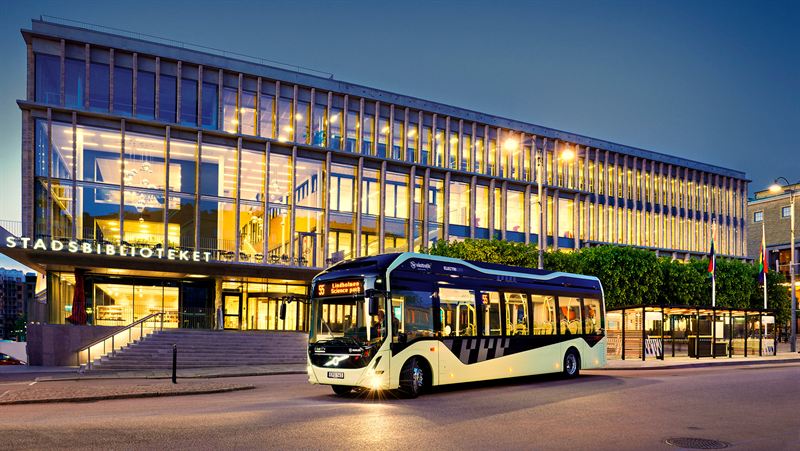ElectriCity readying for the next phase – expanding traffic with electric vehicles

After two successful years with electric buses on route 55 in Gothenburg, Sweden, the partners in the ElectriCity venture have decided to expand electric bus operations in the city. In June next year two electrically powered high-capacity buses will start operating on route 16. At the same time, plans are under way to expand the demo arena with heavy vehicles for quiet and emission-free urban traffic.
“Gothenburg has a strong automotive industry and is the Nordic region’s logistics hub. One benefit is that we get involved early in testing next-generation technology. That’s exciting and we learn more together with our partners in ElectriCity than we would do alone. We take these lessons with us in our urban planning as Gothenburg grows into an attractive large city. Tomorrow’s quiet vehicles emitting no exhaust gases will make the city even more appealing for people to live in, work in and enjoy. I’m happy and proud that our cooperative venture has been so successful that we now want to go further in the next phase,” says Stefan Eglinger, Director of Urban Transport Administration, City of Gothenburg.
ElectriCity has brought together companies, researchers, public authorities, the city and the region since 2013 to test and develop new solutions for sustainable transport and sustainable urban development. The most noticeable result is bus route 55 where ten all-electric or partially electrified buses have been operating since 2015. According to the original plan the tests were scheduled to end in 2018, but now the trial is being extended with additional vehicles and the test period will continue to 2020.
When the Volvo Ocean Race comes to Gothenburg in June 2018, two electrically powered articulated buses will showcase the latest developments as they operate between Nordstan and Frihamnen. These two prototype buses will then run on route 16, which will be equipped with charging infrastructure and bus stop facilities for electrified high-capacity traffic. Among much else, new charging stations will be built at Eriksbergstorget and Sahlgrenska Hospital.
“We know that the people of Västra Götaland want more electric buses, and that passengers who currently use route 55 are very satisfied,” says Ulrika Frick, chair of the Region Västra Götaland public transport board, responsible for the development of public transport in Västra Götaland.
“We want more people to give up their cars, cut emissions and reduce noise levels. Electric buses help us reach these targets and our mission is to create the public transport of the future. That’s why we are now looking forward to the next big step, testing larger electric buses on more frequent routes and with more passengers.”
From previously focusing primarily on electrified public transport, the demo arena is now growing to encompass other electrically powered heavy vehicles operating quietly and emission-free in city traffic.
“Electrification is on the march within the global transport sector, and the next challenge is to integrate electrification with investments in future smart and sustainable cities. This is why we need to demonstrate electrifyed articulated buses and other heavy vehicles in the city environment. With this project Sweden can lead these developments and at the same time take a major step forward for a fossil free Swedish transport sector,” says The Swedish Energy Agency's Director General, Erik Brandsma.
Within the framework of ElectriCity work will also commence on testing solutions in automation, such as automatic Bus Stop Docking and bus platooning whereby buses run close behind one other in long trains in urban traffic.
“Changes to the transport sector are essential if we are to create a sustainable society and next-generation cities. We need to implement sustainable transportation of both people and goods in our cities. That’s why it feels particularly gratifying that we are now expanding the ElectriCity demo arena and beginning to examine solutions for automation that can help make electrified vehicles even more efficient,” says Niklas Gustafsson, Chief Sustainability Officer for Volvo Group.
Facts ElectriCity
ElectriCity is a joint project bringing together the research fraternity, industry and society, allowing new solutions for tomorrow’s sustainable city transport to be developed, demonstrated and evaluated. The partners involved are Volvo Group, the Västra Götaland Region, Västtrafik, the City of Gothenburg, Chalmers University of Technology, the Swedish Energy Agency, Johanneberg Science Park, Lindholmen Science Park, Göteborg Energi, Älvstranden Utveckling, Ericsson, Keolis, Akademiska Hus and Chalmersfastigheter.
For more information about the ElectriCity project visit: www.goteborgelectricity.se
2017-06-15
Journalists who would like further information, please contact:
Niklas Gustafsson, Chief Sustainability Officer, Volvo Group
+46 73 9028850
For more stories from the Volvo Group, please visit www.volvogroup.com/press.
The Volvo Group is one of the world’s leading manufacturers of trucks, buses, construction equipment and marine and industrial engines. The Group also provides complete solutions for financing and service. The Volvo Group, which employs about 95,000 people, has production facilities in 18 countries and sells its products in more than 190 markets. In 2016 the Volvo Group’s sales amounted to about SEK 302 billion (EUR 31,9 billion). The Volvo Group is a publicly-held company headquartered in Göteborg, Sweden. Volvo shares are listed on Nasdaq Stockholm. For more information, please visit www.volvogroup.com.


